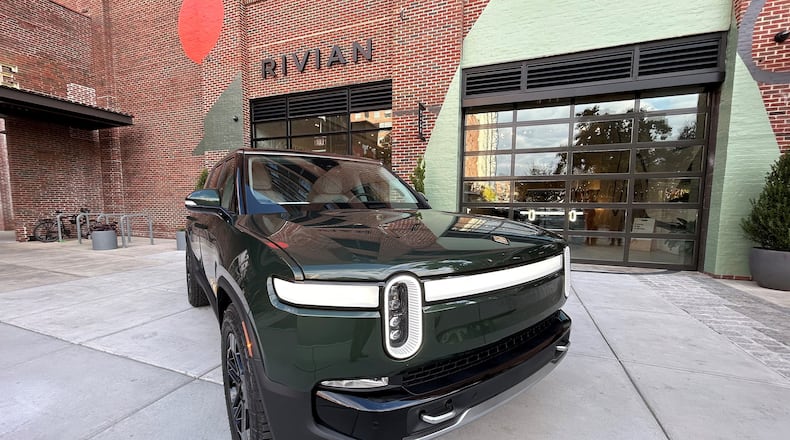Rivian jolted Wall Street late Tuesday with its announced joint venture with Volkswagen Group, a potential $5 billion partnership to develop software for next-generation electric vehicles.
The deal sent Rivian shares Wednesday to their highest value since February. It also gave Georgia officials and industry observers some hope that the investment will help soon kickstart the company’s paused $5 billion factory an hour east of Atlanta.
In March, Rivian put on pause its Georgia plant, first announced in 2021, in a bid to conserve cash. Rivian CEO RJ Scaringe said Tuesday the partnership with Volkswagen will provide the company the capital it needs to grow and help launch the Georgia project.
A firm timeline so far has not been announced. Many in Georgia will be watching for possible clues in the weeks and months ahead.
“This is a great influx of much-needed investment for Rivian, and I am happy to see this,” said state Rep. Tim Fleming, R-Covington, who represents the area around the factory site. “While we are still waiting on Rivian to provide Georgia with a timeline for their plans, my hope is this will accelerate this process so they can keep their commitment to the state.”
During Rivian’s investor day event on Thursday, Scaringe focused on the company’s cost-saving measures and innovations going into the company’s vehicles. He reiterated that the Georgia plant will be vital to scaling Rivian’s future lower-priced, mid-sized models.
“Georgia is still a very important part of our strategy,” he said.
‘Very important to Rivian’
Rivian’s factory development timeline had already drifted from an original opening date this year, set back in part by legal wrangling over the mammoth $1.5 billion package of incentives offered Rivian to land the factory and 7,500 promised jobs.
Most of the incentives, however, only accrue to Rivian if it collectively meets 80% of its promised jobs and investment by the end of 2030 and maintains those metrics through 2049. Otherwise, they’d be subject to claw back measures.
Credit: arvin.temkar@ajc.com
Credit: arvin.temkar@ajc.com
Rivian has said it will honor its commitments.
“This partnership does provide really a capital road map to not only secure and support the launch of R2 in Normal, [IIlinois], but also support the launch of that mid-size platform in our Georgia facility and our path to positive free cash flow,” Scaringe told reporters Tuesday.
The state Department of Economic Development declined to comment Wednesday. A representative of the development authority that oversees the factory property in southern Walton and Morgan counties said the agency “congratulates Rivian on their announcement as it continues to be an innovative leader within the EV industry.”
Rivian has yet to turn a profit and has been hobbled by supply chain and manufacturing disruptions and a softening market. Upstart EV makers like Rivian, Lucid and even market leader Tesla have struggled amid softening EV sales. Another EV maker, Fisker, recently declared bankruptcy.
But established automakers like Volkswagen, General Motors and Ford also have struggled with the EV transition. VW has encountered problems with software it has developed in-house.
Volkswagen plans to invest $3 billion directly into Rivian and another $2 billion into the software JV through 2026, provided Rivian meets certain milestones. The goal is to produce software that both companies can deploy in their future vehicles that will also make the EVs cheaper to produce and — the hope is — profitable.
Rivian’s R1T trucks and R1S SUVs have been well-reviewed by the auto industry press and the company brings well-regarded software expertise to the deal. Volkswagen brings its mass production acumen.
Kevin Ketels, an associate professor and expert in automotive supply chains at Wayne State University in Detroit, called the VW deal an endorsement of Rivian by one of the world’s biggest automakers.
“This deal is very, very important to Rivian. VW has effectively extended them a lifeline and provided them the capital they need to continue to build scale,” Ketels said.
Rivian plans to start production of its smaller R2 crossover, a more mass-market vehicle, at its plant in Normal, Illinois, in 2026. That’s the vehicle Rivian had said it would launch at the Georgia factory.
Credit: Steve Schaefer /
Credit: Steve Schaefer /
Starting R2 in Illinois at the company’s sole factory will save $2.2 billion in the medium term, the company has said. Rivian has said it will still lose money in 2024, but it expects to eke out a profit during the fourth quarter.
Putting the factory on pause irritated many Georgia lawmakers, some of whom sought a way to punish Rivian. Gov. Brian Kemp said the state would continue to honor its contract with Rivian, but he said he expected Rivian to uphold its end of the deal.
State and local officials, meanwhile, have pushed the company to outline how it will secure and maintain the sprawling property, much of which had been denuded and graded in preparation for vertical construction.
In April, Rivian asserted it would secure the site and even perform some predevelopment work. Rivian is also working on obtaining an air permit in advance of factory development and has launched a website touting its planned Georgia investment.
‘Got to perform’
The VW investment, if all goes to plan, will make Volkswagen one of Rivian’s biggest investors. Cox Enterprises, which owns The Atlanta Journal-Constitution, owns about a 3% stake in Rivian.
Ketels said the deal “speaks to the confidence in (Rivian’s) product.”
“They have a very good product,” he said. “It’s just very expensive and capital intensive to build this from scratch.”
Mass production is very difficult, especially for something as sophisticated as EVs, Ketels said. Rivian produced 57,000 vehicles last year and expects production to be flat this year.
Rivian lost about $39,000 for each vehicle it sold in the first quarter, but that loss is expected to narrow.
At the investor meeting, Rivian executives outlined technology upgrades and significant cost savings the company has achieved in simplifying manufacturing practices and redesigning its current lineup of vehicles. Those advances also will go into the R2 and R3 product lines to drive profitability, executives said.
The Illinois factory capacity will grow to 215,000 vehicles, including capacity for 155,000 R2 models, officials have said. The company sees the future Georgia factory being capable of producing 400,000 additional vehicles a year, including R2 and other future models that will be targeted to the U.S. and overseas.
As the market for high-dollar EVs has softened, automakers are looking to produce profitable entry-level and middle-market vehicles that can be volume sellers. EVs at competitive prices with conventional vehicles are key to electric adoption.
Claire McDonough, Rivian’s chief financial officer, said the VW investment and the efficiencies Rivian is focused on achieving that the company has a clear path to profitability and to self-funding future product development.
Ketels said Volkswagen’s mass production know-how will be invaluable to Rivian’s future. But VW needs Rivian’s technology just as much. To get the full $5 billion investment, Ketels said Rivian will have to deliver what Volkswagen needs.
“They’ve got to perform. They’ve got to be smart,” he said of Rivian. “I don’t think Volkswagen is going to give them all $5 billion unless they’re able to perform, do it efficiently. They’ll need to see a return on that investment.”
-Staff writers Greg Bluestein, Zachary Hansen and Savannah Sicurella contributed to this report.
About the Author
Keep Reading
The Latest
Featured




